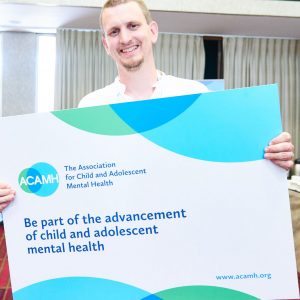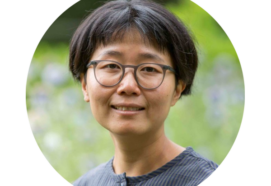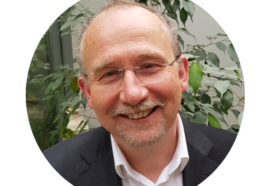Paediatrician and ACAMH Board Member Dr Max Davie runs the over-fives developmental assessment service in Lambeth and is the designated doctor for education in the borough. He is also school doctor for Elm Court School and Lansdowne School.
Max became fascinated by mental health and neurodevelopmental conditions during his training and has become an advocate for improving the mental health education curriculum for trainee paediatricians.
His day to day work involves the assessment of school-age children who may be struggling with their behaviour or social interactions which often leads to a diagnosis of autism or attention deficit hyperactivity disorder (ADHD).

However, Max’s work encompasses many children struggling due to social vulnerability, safeguarding issues, cognitive and language problems as well as previous abuse and trauma.
Community paediatricians, Max said, see mental health problems in around 50% of their patients but in the past paediatricians’ training in the area had been patchy.
“I became very interested in autism when I was training and later in ADHD when I was able to do some work with the CAMHS [child and adolescent mental health service] team when I was doing my specialist training in Reading that moved me in a more mental health Direction.
“I’ve been involved with mental health curricula and education and I became interested in this odd situation in paediatrics where paediatricians were doing a vast amount of mental health work but not really having any training in it.”
This picture is shifting, however, and paediatricians in the community and acute sector now have access to an annual course in mental health and the Paediatric Mental Health Association has been growing. Max was also made the Royal College of Paediatrics’ first ever Mental Health Officer.
Max said he had seen patterns in the diagnosis of certain conditions over the years including surges of autism and ADHD diagnoses which seemed to be reaching a plateau.
“I’m concerned there may be a rise in the presentation of eating disorders although I’m really interested to get better population data on that this year. There’s undoubtedly been many more presentations of self-harm to paediatricians although it’s not an area I’ve done a lot of work in.”
As a whole Max said the main challenge for mental health services was to start taking a more holistic view of itself.
“The challenge for mental health is to start thinking of ourselves as a system not as a series of different services and that’s extremely difficult to achieve.
“NHS finances are deteriorating year-on-year and real-world, frontline funding for children’s mental health is always going to be vulnerable unless we have much more robust commissioning and much more robust local systems.”
Max also pointed to the government’s recent green paper on children and young people’s mental health which has been criticised for ignoring the role of societal influences and inequality in the development of mental health problems.
“In Lambeth there’s been a reduction in the number of children’s centres and a reduction in families’ access to those centres and there’s been large cuts in CAMHS which we haven’t recovered from.
“Community support for families and young people is much less than it was around 10 years ago and I think that’s had a knock-on effect in all sorts of ways in shifting the curve in the wrong direction for children’s mental health, behaviour and wellbeing generally.”
Max said in highly stressful times for healthcare professionals he was glad he was still approachable and available to colleagues: “In Lambeth I’m very proud of the fact that people know they can get in touch with me and ask me anything. That sounds like a trivial thing but I think that more broadly if we are going to get out of this mess in the mental health services, free and quick and informal communication between teams is going to be absolutely essential.”
Before getting involved with ACAMH Max said he was wary of joining a “talking shop” but saw immediately that the organisation was active in engaging the broader mental health community.
He said he was impressed with its relaunched website, podcasts, events and accessible clinical guides.
He added: “I would like to see ACAMH broaden out from its traditional audiences of psychologists and psychiatrists. I’d like to see more paediatricians join and I’d like to see more events that are joint with paediatricians.”


